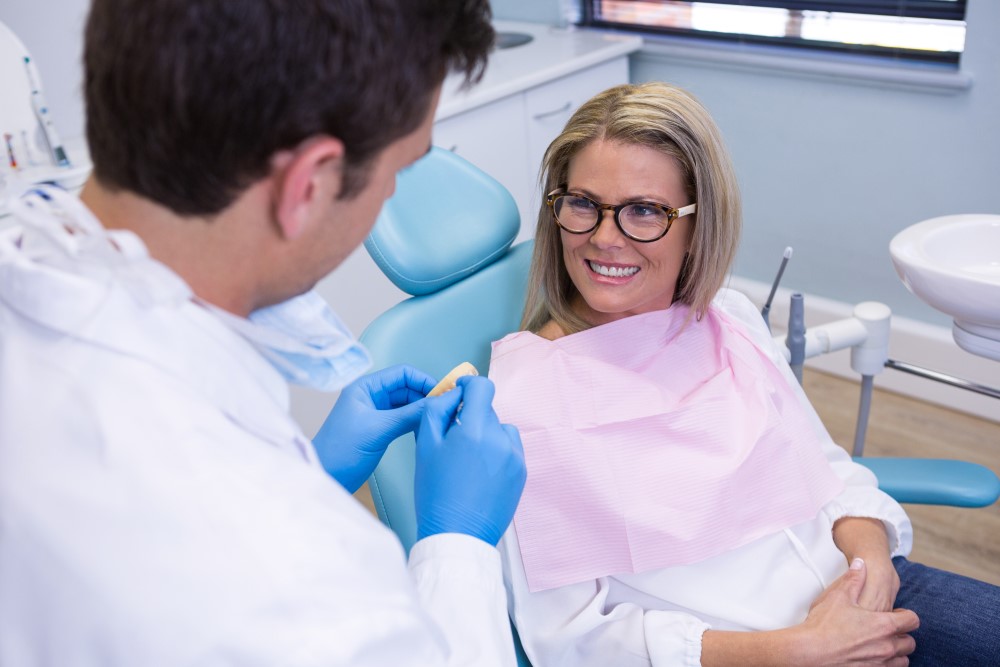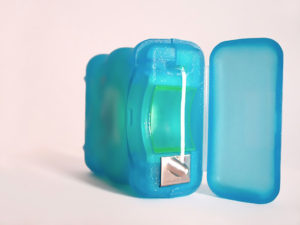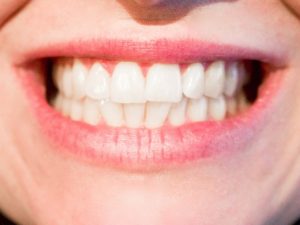Our dental team is pleased to provide high-quality removable dentures to new and existing patients who have experienced the loss of some or all of their teeth. These dentures are custom-crafted to fit the individual patient’s mouth and specific tooth replacement needs. They provide both a cosmetic and functional replacement solution for tooth loss.

To make the dentures, we will make a series of impressions of the patient’s jaw, teeth, and gums, including several measurements. A model will be crafted, tested, and adjusted until the color, shape, and fit of the denture are right for the patient’s unique needs. Once the model is ready, it is sent to the dental lab and used to cast the permanent denture. Finally, the patient will receive the permanent denture and minor adjustments will be made, if necessary, to ensure comfort and fit.
There are two basic types of dentures: Conventional Full Dentures and Partial Dentures. Each of these meets a different teeth replacement need.
- Conventional Full Dentures are a great option if a patient needs replacement for all of the upper and/or lower teeth. Once the gums have fully healed from any extractions, we will take impressions and measurements of the jaws and gums. These are used in crafting a custom model of the future denture. The model will be adjusted for fit, then sent to the lab for the denture to be made. Once complete, he will fit the denture to the patient’s mouth, making any minor adjustments needed to ensure a secure, comfortable fit.
- Partial Dentures, also known as Dental Bridges, are a replacement for one or more missing teeth. Besides the aesthetic reason for bridges, patients often choose to have a bridge to prevent teeth from rotating or shifting into the empty spaces caused by tooth loss. A standard bridge places a crown on the teeth surrounding the empty space, then attaches a replacement tooth to those crowns. We will match the replacement to the patient’s natural teeth for a consistent look to their smile.
With any form of dentures, the patient should follow up with the doctor as recommended. We may need to make adjustments to dentures over time to keep proper fit and full comfort. Dentures should be cleaned regularly using a soft bristle toothbrush and a non-abrasive cleanser to avoid build up of plaque. Generally, dentures should be replaced every 5-10 years. Ask our doctor to evaluate whether your dentures should be refit or replaced.
For more information or to schedule a consultation, contact our office today.







 Your smile is one of the first things a person will notice when you meet. If you would like to improve your smile with a simple procedure, teeth whitening may be a great option for you, especially if you have stained, dull or discolored teeth. Our dental office is providing teeth whitening services to new and existing patients.
Your smile is one of the first things a person will notice when you meet. If you would like to improve your smile with a simple procedure, teeth whitening may be a great option for you, especially if you have stained, dull or discolored teeth. Our dental office is providing teeth whitening services to new and existing patients. Loose teeth, bad breath, and painful, bloody gums – these are among the signs and symptoms of periodontal, or gum, disease. Unfortunately, periodontal disease can also begin without any obvious symptoms. If left undiagnosed or untreated, you could be at risk for irreparable damage to your teeth and gums. The good news is that periodontal disease is preventable. In fact, one of the most effective tools for preventing the disease only takes a minute of your time each day.
Loose teeth, bad breath, and painful, bloody gums – these are among the signs and symptoms of periodontal, or gum, disease. Unfortunately, periodontal disease can also begin without any obvious symptoms. If left undiagnosed or untreated, you could be at risk for irreparable damage to your teeth and gums. The good news is that periodontal disease is preventable. In fact, one of the most effective tools for preventing the disease only takes a minute of your time each day. Do you brush your teeth after lunch? If you’re one of the millions of people who work outside the home, chances are you don’t have the time or resources to brush during the day. However, not being able to brush doesn’t mean you can’t protect your teeth at work.
Do you brush your teeth after lunch? If you’re one of the millions of people who work outside the home, chances are you don’t have the time or resources to brush during the day. However, not being able to brush doesn’t mean you can’t protect your teeth at work. Teeth grinding, known as bruxism, is a habit many get into without even realizing it. Grinding your teeth can be damaging for several reasons. If you or your child have been struggling with teeth grinding, make an appointment to see us. We will assess the damage to the teeth, as well as assist you in addressing solutions. Here’s what you need to know about teeth grinding.
Teeth grinding, known as bruxism, is a habit many get into without even realizing it. Grinding your teeth can be damaging for several reasons. If you or your child have been struggling with teeth grinding, make an appointment to see us. We will assess the damage to the teeth, as well as assist you in addressing solutions. Here’s what you need to know about teeth grinding. Mouthwash can be helpful in decreasing the amount of bacteria in your mouth. It can also be a useful way of combating decay. But not everyone needs to use a mouthwash. If you are wondering whether you should be using a mouthwash, here’s what you need to know.
Mouthwash can be helpful in decreasing the amount of bacteria in your mouth. It can also be a useful way of combating decay. But not everyone needs to use a mouthwash. If you are wondering whether you should be using a mouthwash, here’s what you need to know.